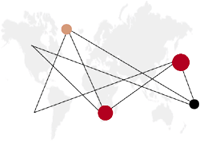
| RESOURCES | |
|
Launch of The Higher Education Task Force Report Wednesday, March 1, 2000 Omni Shoreham Hotel, Regency
Ballroom, Washington, D.C. I just want to thank everybody for the comments they made and I think we welcome them and hope that the website, both the one that Henry referred to and the one that the Bank is setting up, will be an active one where people can really make further improvements about this document. I just want to touch on two issues. One: the question
of international standards and whether or not they can reasonably
apply to developing countries. I am absolutely passionate about
the ideal. I believe the way in which we transformed university
of Cape Town in South Africa - and I hope that model will permeate
into the work we are doing now for the system as a whole - demonstrates
unequivocally that poor people need excellence even more than rich
people, because they haven't got the choices we've got, nor the
ability to make those choices to distinguish good from bad. Therefore,
unfortunately, we have to have a system that has clear regulatory
frameworks and expectations and some kind of boundaries set so that,
as in my country now, we don't get private providers coming in and
disadvantaging those people who are disadvantaged by apartheid,
because they haven't got the means to distinguish between good and
bad. So I believe equity and excellence go together, and if you sacrifice one of those you end up with mediocrity. The poor can suffer from mediocrity. By that I don't mean every university must be a research university nor that every country must necessarily have top-level research universities, but they must have good quality universities where the qualification means something to those people. The second point I want to make is on student politics. I think therein lies the challenge about rights and responsibilities. They are not only referring to levels of staff but they also apply to students. I think that too often vice-chancellors or presidents of universities are too timid in setting boundaries about those rights and responsibilities. If you want rights, there are certain obligations that go with those rights. At my university, for example, we had a very ugly strike in 1991 where students broke windows and smashed this, that and the other. My predecessor said, "Those poor guys, you can't really punish these people." I said, "These are young people with brains. They are as responsive to boundaries as your son and my son is. To treat them as sub-humans with some kind of " You know it's different standards for different people. Young people everywhere in the world respond positively to boundary setting with rewards and punishment for performance which is inappropriate, particularly with behavior which infringes on the rights of other people. And that is very important, particularly in our case where we are dealing with a legacy of struggle. It's fine to have had struggle, to have used whatever tactics. The point is now the challenge is for us as a higher education system to educate responsible citizens to take ownership and be stewards of the new democracy. They cannot be stewards if they are destroying the public goods that higher education represents. So I think that is a failure of adults and not necessarily the fault of students that we have this disruption. |